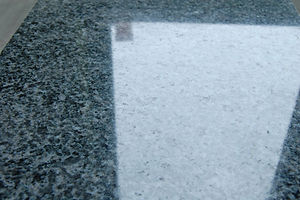
Processing
Stone processing is a complex, multi-stage process that changes both the visual appearance of the stone and the
both its mechanical properties.
The stone blocks are sawn, then the edges and surfaces of the stone are treated to obtain the desired shape and structure.
The most popular types of processing of natural stone products are the following:

Polishing
The surface of the stone is polished to a shine - it gives a mirror and luxury effect.

Burning
Remove the top layer of stone with fire, so
becomes rough.

Grinding
The surface of the stone is sanded until it becomes lightly matte.

Kissing
The surface of the stone is machined and becomes very rough.

Sandblasting
Makes the stone surface slightly rough.

Antiquing
Treat the stone surface with an abrasive brush, simulating aging.
* In addition, chemical treatment of stone surfaces is recommended, which improves the aesthetic and physical properties of the stone.

Īpaši virsmu dizaini

Īpaši virsmu dizaini

Īpaši virsmu dizaini

Īpaši virsmu dizaini
Special surface designs
Stone care
Proper and regular stone care is a key condition for natural stone products
would last a long time and their appearance would not change.
Scratches and other damage will be less noticeable if the stone is cared for regularly and properly,
using only cleaning and care products intended for natural stone.
Marble requires special care. Its surface deteriorates rapidly when exposed to acidic substances. Matte stains that cannot be cleaned appear quickly on the polished surface and the stone surface must be repainted. Therefore, care should be taken to avoid contact with acidic liquids (wine, fruit juices, lemonade, vinegar, lemon juice) and cleaning agents on marble surfaces.
Abrasive cleaners, hard brushes and sharp objects that can cause scratches and scratches are not recommended for care.
Stone surfaces in bathrooms are exposed to water and should be treated regularly with
which protects against water and oils.
Kitchen worktops made of marble or granite must be treated with agents that prevent the infiltration of oil, grease, dirt and water into the worktop. If the surface of the stone comes into contact with strong staining products (beets, cherry juice), stains should be removed immediately with a damp cloth.
